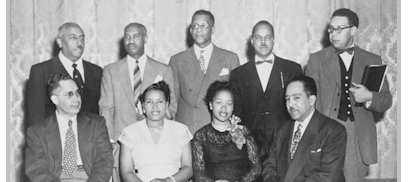James D. Corrothers was born in Michigan. His mother died in childbirth and he was raised by his grandfather. Pretty much orphaned as a child, he worked a succession of odd jobs. He was “discovered” in conversations with customers while shining shoes in a barbershop in Chicago. He managed to work his way through three years of study at Northwestern. He completed his fourth year of studies at Bennett College in Greensboro, NC.
In addition to writing poetry, Corrothers worked as a minister in several denominations in the early 1900’s. He claimed in his memoir to have introduced Paul Laurence Dunbar’s poetry to a famous publisher and literary critic, William Dean Howells, who later championed Dunbar’s work and helped him gain a cross-over audience.
Writing several years in advance of the Harlem Renaissance, Corrothers’ poems were included in most of the early anthologies of African-American poetry. The double sonnet below is a piece he wrote in dedication to the life and work of Paul Laurence Dunbar.
James D. Corrothers – Paul Laurence Dunbar
From Kerlin, 1923. Negro Poets and Their Poems
He came, a youth, singing in the dawn
Of a new freedom, glowing o’er his lyre.
Refining, as with great Apollo’s fire,
His people’s gift of song. And thereupon,
This Negro singer, come to Helicon,
Constrained the masters, listening to admire,
And roused a race to wonder and aspire,
Gazing which way their honest voice was gone,
With ebon face uplit of glory’s crest.
Men marveled at the singer, strong and sweet,
Who brought the cabin’s mirth, the tuneful night,
But faced the morning, beautiful with light,
To die while shadows yet fell toward the west,
And leave his laurels at his people’s feet.
Dunbar, no poet wears your laurels now;
None rises, singing, from your race like you.
Dark melodist, immortal, though the dew
Fell early on the bays upon your brow,
And tinged with pathos every halcyon vow
And brave endeavor. Silence o’er you threw
Flowerets of love. Or, if an envious few
Of your own people brought no garlands, how
Could malice smite him whom the gods had crowned?
If, like the meadow-lark, your flight was low,
Your flooded lyrics half the hilltops drowned;
A wide world heard you, and it loved you so,
It stilled its heart to list the strains you sang.
And o’er your happy songs its plaudits rang.
